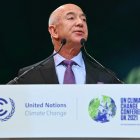Jeff Bezos reveals why the Washington Post won't endorse Harris and Musk congratulates him
The media outlet has lost 200,000 subscribers in the last few hours and several journalists have resigned from the paper.

The Washington Post did not endorse a candidate for the first time since 1988
Jeff Bezos, CEO of Amazon and owner of the Washington Post, one of the most important newspapers in U.S. history, revealed in an op-ed why the media outlet made the unexpected decision not to endorse Democratic Vice President Kamala Harris in the presidential race.
According to Bezos, who cited Gallup data, Americans today no longer trust the media, with it registering even below institutions with low trust ratings such as the U.S. Congress. For the billionaire, this inescapable reality led to his decision that the Washington Post must change the way it does journalism, and the time is now.
"Our profession is now the least trusted of all. Something we are doing is clearly not working," Bezos wrote, before elaborating on how to regain the public's trust.
"We must be accurate, and we must be believed to be accurate. It’s a bitter pill to swallow, but we are failing on the second requirement," the Amazon CEO said. "Most people believe the media is biased. Anyone who doesn’t see this is paying scant attention to reality, and those who fight reality lose. Reality is an undefeated champion. It would be easy to blame others for our long and continuing fall in credibility (and, therefore, decline in impact), but a victim mentality will not help. Complaining is not a strategy. We must work harder to control what we can control to increase our credibility."
Bezos' opinion column comes at a critical time for the Washington Post, which has lost about 200,000 subscribers in the past few hours and has seen dozens of its journalists resign in protest of the decision not to endorse Harris.

Politics
The Washington Post refuses to endorse Harris over Bezos decision, provokes fury from editors
Virginia Martínez
Bezos later explained that newspaper endorsements in elections do not actually tip the scales for any candidate, but instead create the perception that the media are not objective and have policy preferencess. Thus, the decision to end the tradition of endorsements, he said, is one based on "principle, and it's the right one."
But then Bezos conceded that the media has a long way to go if it wants to regain the public's trust, noting that major dailies such as the WaPo or The New York Times have lost some of their prestige and credibility because, to a large extent, they already look like media that only talk to the elite and don't understand ordinary Americans.
"By itself, declining to endorse presidential candidates is not enough to move us very far up the trust scale, but it’s a meaningful step in the right direction. I wish we had made the change earlier than we did, in a moment further from the election and the emotions around it. That was inadequate planning, and not some intentional strategy," Bezos said.
Surprisingly, Bezos' words generated a lot of praise on social networks.
One of the influencers who congratulated Bezos was tycoon Elon Musk, who published a post acknowledging the value of the WaPo owner's words.
Indeed, kudos to @JeffBezos https://t.co/UNh4rlB3lS
— Elon Musk (@elonmusk) October 29, 2024













